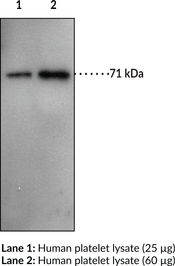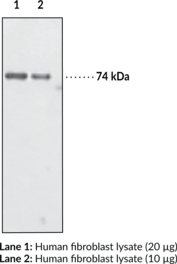Description
Prostaglandins (PGs) are signaling molecules that modulate physiological or pathologic functions such as platelet aggregation, vascular tone, gastric cytoprotection, uterine contraction, inflammation, cancer and Alzheimer’s disease.{310,1606,3947,9898,10008,11300} PG transporter (PGT) is generally expressed in endothelial and epithelial cells. Transport of extracellular PGs into cells occurs via a specific PGT, allowing PG oxidation by 15-hydroxy PG dehydrogenase or binding with their respective receptor(s).{1917,3471,21013} Cayman’s peptide-affinity purified PGT polyclonal antibody detects a 71 kDa band on WB. Loss of PGT detection may occur due to cell membrane aggregation during exposure of some samples to high temperature processing.{21648} Therefore treatment of the protein sample at 37°C for 15 minutes (water bath or heating block), and if desired, in parallel with another aliquot at 95°C is recommended prior to electrophoresis and blotting. When using the antibody for ICC or IF, cell permeabilization is necessary due to the intracellular location of the antibody binding site (C-terminal amino acids).
Synonyms: OATP2A1|PGT|SLCO2A1|Solute carrier organic anion transporter family member 2A1
Immunogen: A synthetic peptide from the C-terminal region of human PGT
Formulation: 500 µl of peptide affinity purified polyclonal antibody
Isotype:
Applications: WB
Origin: Animal/Rabbit
Stability: 365 days
Application|Immunocytochemistry||Application|Immunofluorescence||Application|Western Blot||Product Type|Antibodies|Polyclonal Antibodies||Research Area|Cardiovascular System|Blood|Coagulation & Hemostasis||Research Area|Cardiovascular System|Vasculature|Endothelium||Research Area|Immunology & Inflammation|Inflammatory Lipid Mediators|Prostaglandins||Research Area|Lipid Biochemistry|Cyclooxygenase Pathway||Research Area|Neuroscience|Neurodegenerative Disorders|Alzheimer’s Disease


